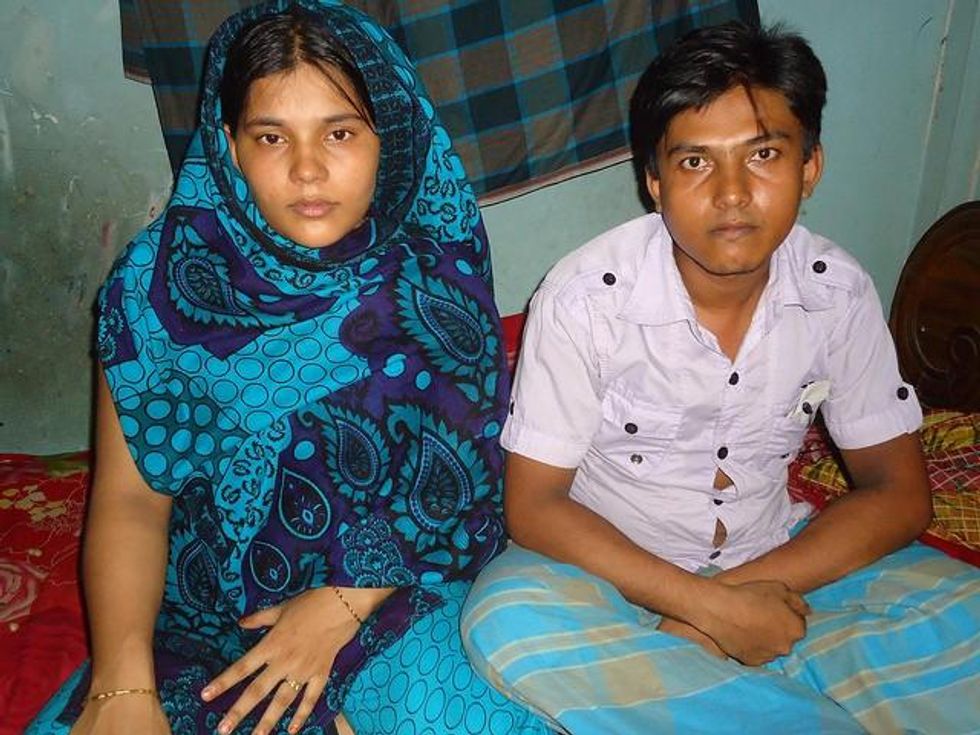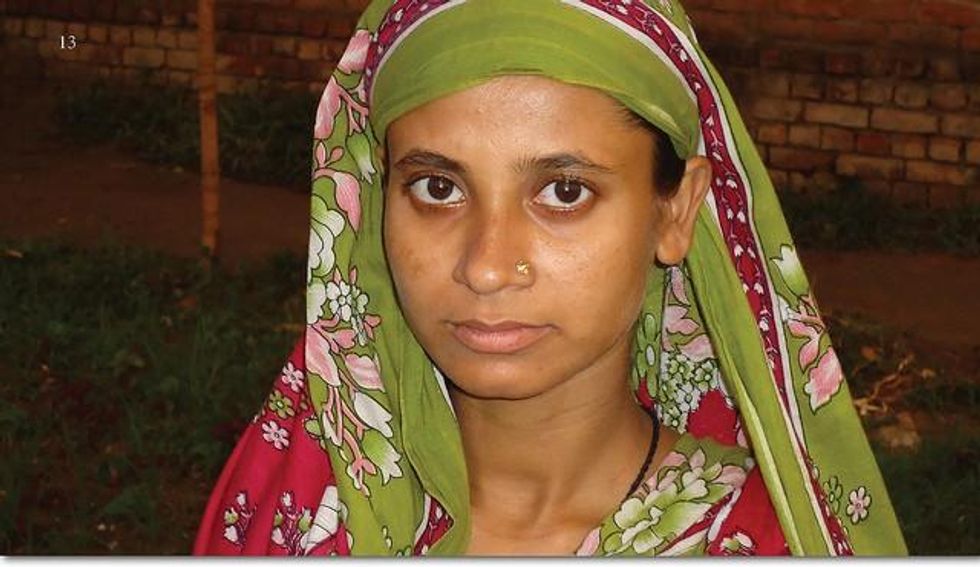

SUBSCRIBE TO OUR FREE NEWSLETTER
Daily news & progressive opinion—funded by the people, not the corporations—delivered straight to your inbox.
5
#000000
#FFFFFF
To donate by check, phone, or other method, see our More Ways to Give page.


Daily news & progressive opinion—funded by the people, not the corporations—delivered straight to your inbox.

According to a 68-page report released Thursday by the Institute for Global Labour and Human Rights, stories like Begum's are commonplace in the 3,750-worker Next Collections factory in Ashulia, Bangladesh, on the outskirts of Dhaka, where physical punishments--including slapping and beating--are routine, pregnant workers are subject to illegal firings or forced to toil without maternity leave, and wages are dismally low at 20 to 24 cents an hour.
This sweatshop is not isolated but, rather, owned by the second largest garment exporter in Bangladesh, Ha-Meem Group, which has 26 factories and 30,000 workers under its domain and is notorious for busting worker attempts to organize. These abuses occur with the complicity of major U.S. retailers who buy garments from these sweatshops while ignoring their abuses, the report charges.
"It is impossible to live a decent life with the income that we are earning at the cost of our health and life," declares Zesmin Khatun, who was was six months pregnant when management at New Collections illegally terminated her, denied her maternity leave, severance, and other benefits.
The report, entitled Gap and Old Navy in Bangladesh: Cheating the Poorest Workers in the World, outlines a litany of abuses at the New Collections factory, where 70 percent of goods produced end up in the hands of Gap and Old Navy.
"Next Collections workers are forced to toil 14- to 17-plus-hour shifts, seven days a week, routinely putting in workweeks of over 100 hours," the executive summary reads. "Workers are visibly sick and exhausted from the grueling and excessive hours."
"Workers live in miserable poverty in tiny primitive hovels. By the third week in a month, most have no money left for food," the report continues.
The stories of individual tragedy are extensive. Mazharul Islam described being physically attacked and threatened with death when his wife asked for maternity leave. "[T]he managing director kicked me hard on my back two or three times. He ordered a security guard to beat me with a cane stick," he recounted. "I thought I would faint."
Gap and other major retailers allow these abuses to continue through their complicity, including their refusal to release internal corporate audits, as well as their direct benefiting from the efforts of sweatshop managers to cover up their abuses, the report charges.
These violations continue despite global outrage, record garment worker protests, and corporate promises of reform after the collapse of a garment factory in April that killed more than 1,200 workers and injured over 2,500, with most victims women.
"How many pregnant women workers will have to suffer to establish the rule of law at factories like Next Collections?" asks Begum.

Dear Common Dreams reader, The U.S. is on a fast track to authoritarianism like nothing I've ever seen. Meanwhile, corporate news outlets are utterly capitulating to Trump, twisting their coverage to avoid drawing his ire while lining up to stuff cash in his pockets. That's why I believe that Common Dreams is doing the best and most consequential reporting that we've ever done. Our small but mighty team is a progressive reporting powerhouse, covering the news every day that the corporate media never will. Our mission has always been simple: To inform. To inspire. And to ignite change for the common good. Now here's the key piece that I want all our readers to understand: None of this would be possible without your financial support. That's not just some fundraising cliche. It's the absolute and literal truth. We don't accept corporate advertising and never will. We don't have a paywall because we don't think people should be blocked from critical news based on their ability to pay. Everything we do is funded by the donations of readers like you. Will you donate now to help power the nonprofit, independent reporting of Common Dreams? Thank you for being a vital member of our community. Together, we can keep independent journalism alive when it’s needed most. - Craig Brown, Co-founder |

According to a 68-page report released Thursday by the Institute for Global Labour and Human Rights, stories like Begum's are commonplace in the 3,750-worker Next Collections factory in Ashulia, Bangladesh, on the outskirts of Dhaka, where physical punishments--including slapping and beating--are routine, pregnant workers are subject to illegal firings or forced to toil without maternity leave, and wages are dismally low at 20 to 24 cents an hour.
This sweatshop is not isolated but, rather, owned by the second largest garment exporter in Bangladesh, Ha-Meem Group, which has 26 factories and 30,000 workers under its domain and is notorious for busting worker attempts to organize. These abuses occur with the complicity of major U.S. retailers who buy garments from these sweatshops while ignoring their abuses, the report charges.
"It is impossible to live a decent life with the income that we are earning at the cost of our health and life," declares Zesmin Khatun, who was was six months pregnant when management at New Collections illegally terminated her, denied her maternity leave, severance, and other benefits.
The report, entitled Gap and Old Navy in Bangladesh: Cheating the Poorest Workers in the World, outlines a litany of abuses at the New Collections factory, where 70 percent of goods produced end up in the hands of Gap and Old Navy.
"Next Collections workers are forced to toil 14- to 17-plus-hour shifts, seven days a week, routinely putting in workweeks of over 100 hours," the executive summary reads. "Workers are visibly sick and exhausted from the grueling and excessive hours."
"Workers live in miserable poverty in tiny primitive hovels. By the third week in a month, most have no money left for food," the report continues.
The stories of individual tragedy are extensive. Mazharul Islam described being physically attacked and threatened with death when his wife asked for maternity leave. "[T]he managing director kicked me hard on my back two or three times. He ordered a security guard to beat me with a cane stick," he recounted. "I thought I would faint."
Gap and other major retailers allow these abuses to continue through their complicity, including their refusal to release internal corporate audits, as well as their direct benefiting from the efforts of sweatshop managers to cover up their abuses, the report charges.
These violations continue despite global outrage, record garment worker protests, and corporate promises of reform after the collapse of a garment factory in April that killed more than 1,200 workers and injured over 2,500, with most victims women.
"How many pregnant women workers will have to suffer to establish the rule of law at factories like Next Collections?" asks Begum.


According to a 68-page report released Thursday by the Institute for Global Labour and Human Rights, stories like Begum's are commonplace in the 3,750-worker Next Collections factory in Ashulia, Bangladesh, on the outskirts of Dhaka, where physical punishments--including slapping and beating--are routine, pregnant workers are subject to illegal firings or forced to toil without maternity leave, and wages are dismally low at 20 to 24 cents an hour.
This sweatshop is not isolated but, rather, owned by the second largest garment exporter in Bangladesh, Ha-Meem Group, which has 26 factories and 30,000 workers under its domain and is notorious for busting worker attempts to organize. These abuses occur with the complicity of major U.S. retailers who buy garments from these sweatshops while ignoring their abuses, the report charges.
"It is impossible to live a decent life with the income that we are earning at the cost of our health and life," declares Zesmin Khatun, who was was six months pregnant when management at New Collections illegally terminated her, denied her maternity leave, severance, and other benefits.
The report, entitled Gap and Old Navy in Bangladesh: Cheating the Poorest Workers in the World, outlines a litany of abuses at the New Collections factory, where 70 percent of goods produced end up in the hands of Gap and Old Navy.
"Next Collections workers are forced to toil 14- to 17-plus-hour shifts, seven days a week, routinely putting in workweeks of over 100 hours," the executive summary reads. "Workers are visibly sick and exhausted from the grueling and excessive hours."
"Workers live in miserable poverty in tiny primitive hovels. By the third week in a month, most have no money left for food," the report continues.
The stories of individual tragedy are extensive. Mazharul Islam described being physically attacked and threatened with death when his wife asked for maternity leave. "[T]he managing director kicked me hard on my back two or three times. He ordered a security guard to beat me with a cane stick," he recounted. "I thought I would faint."
Gap and other major retailers allow these abuses to continue through their complicity, including their refusal to release internal corporate audits, as well as their direct benefiting from the efforts of sweatshop managers to cover up their abuses, the report charges.
These violations continue despite global outrage, record garment worker protests, and corporate promises of reform after the collapse of a garment factory in April that killed more than 1,200 workers and injured over 2,500, with most victims women.
"How many pregnant women workers will have to suffer to establish the rule of law at factories like Next Collections?" asks Begum.
